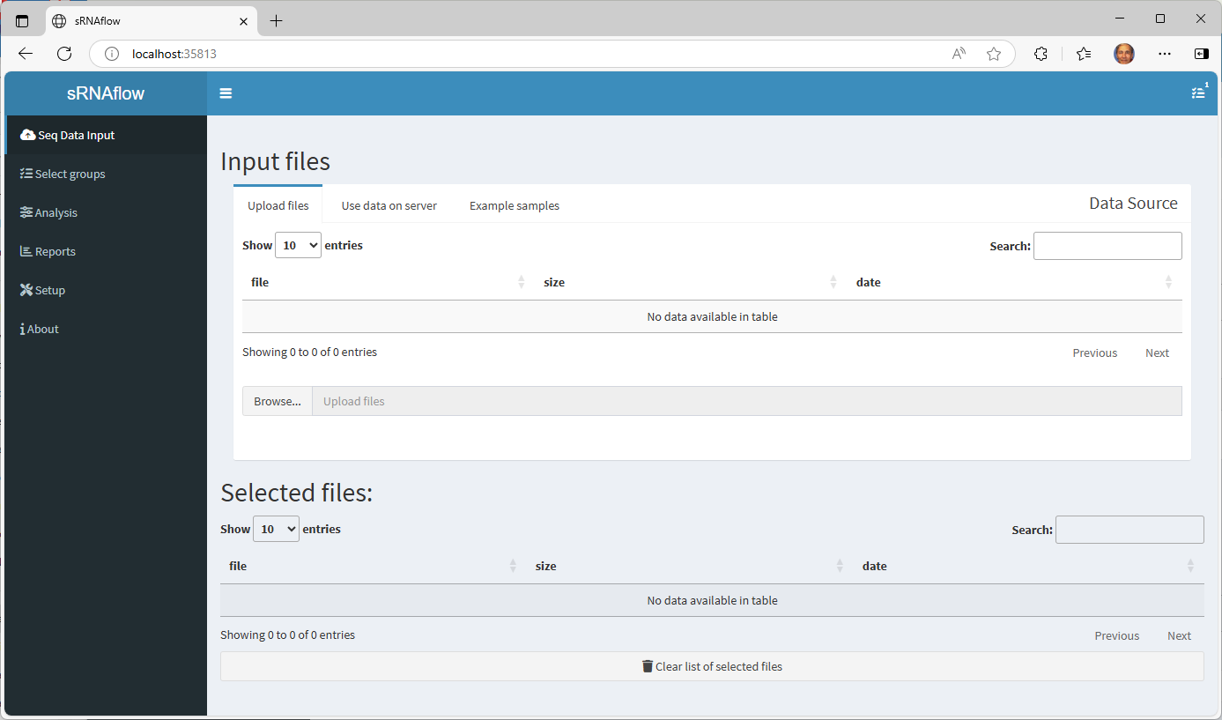sRNAflow: A Tool for the Analysis of Small RNA-Seq Data
sRNAflow is a bioinformatic tool with a web interface designed for the analysis of small RNAs
obtained from biological fluids. It allows filtering potential RNAs
from reagents and environment, classifying small RNA types, managing small RNA annotation
overlap, conducting differential expression assays, analysing isomiRs, and presenting an approach
to identify the sources of small RNAs within samples. sRNAflow also supports an alternative
alignment-free analysis of RNA-seq data, featuring clustering and initial RNA source identification
using BLAST.diseases.
OB
References:
- Pawel Zayakin
sRNAflow: A Tool for the Analysis of Small RNA-Seq Data
Non-coding RNA, 2024, v.10(1). https://doi.org/10.3390/ncrna10010006
Documentation
Important Notes
- Module Name: sRNAflow (see the modules page for more information)
- Unusual environment variables set
- SRNAF_HOME sRNAflow installation directory
- SRNAF_BIN sRNAflow executable directory
- SRNAF_SRC sRNAflow source code directory
Interactive job
Interactive jobs should be used for debugging, graphics, or applications that cannot be run as batch jobs.
Allocate an interactive session and run the program. Sample session:
[user@biowulf]$ sinteractive --gres=lscratch:20 -c8 --tunnel
...
Created 1 generic SSH tunnel(s) from this compute node to
biowulf for your use at port numbers defined
in the $PORTn ($PORT1, ...) environment variables.
Please create a SSH tunnel from your workstation to these ports on biowulf.
On Linux/MacOS, open a terminal and run:
ssh -L 38679:localhost:38679 denisovga@biowulf.nih.gov
...
[user@cn4278]$
$SRNAF_LIB
Store the PORT1 number you get, in this case 38679, and the node_id number, in this case cn4278.
[user@cn4278 ~]$ module load sRNAflow
[+] Loading singularity 4.2.2 on cn4278
[+] Loading sRNAflow 20250717 ...
[user@cn4278 ~]$ cd /data/$USER
[user@cn4278 ~]$ mkdir sRNAflow && cd sRNAflow
[user@cn4278 ~]$ git clone https://github.com/vsoch/singularity-shiny && cd singularity-shiny
[user@cn4278 ~]$ ln -s /usr/local/apps/sRNAflow/20250717/libexec/sRNAflow-20250717.sif shiny.simg
[user@cn4278 ~]$ mkdir -p www/db www/results www/upload/example-samples
[user@cn4278 ~]$ chmod 777 -R www
[user@cn4278 ~]$ mkdir -p /tmp/$USER/logs /tmp/$USER/lib
[user@cn4278 ~]$ export SHINY_LOGS=/tmp/$USER/logs
In the following command, use the $PORT1 id you stored previously:
[user@cn4278 ~]$ /bin/bash prepare_template.sh --port $PORT1 --user $USER --logs $SHINY_LOGS start
[user@cn4278 ~]$ singularity run --bind /tmp/$USER/logs:/var/log/shiny \
--bind /tmp/$USER/lib:/var/lib/shiny-server \
--bind shiny-server.conf:/etc/shiny-server/shiny-server.conf \
--bind www:/srv/shiny-server/www shiny.simg
[2025-07-25T11:28:37.207] [INFO] shiny-server - Shiny Server v1.5.23.1020 (Node.js v18.18.2)
[2025-07-25T11:28:37.217] [INFO] shiny-server - Using config file "/etc/shiny-server/shiny-server.conf"
[2025-07-25T11:28:37.262] [INFO] shiny-server - Starting listener on http://[::]:38679
Now, on your local system (PC or Mac) open a second terminal and run the command to tunnel your system
to the Biowulf port $PORT1.
More specifically, if your local system is Mac, open a new terminal and run the command:
ssh -L $PORT1:localhost:$PORT1 user@biowulf.nih.gov
If your local system is PC, open a PowerShell window and run the command:
putty -ssh -L $PORT1:localhost:$PORT1 user@biowulf.nih.gov
Here, $PORT1 should be replaced by the number you stored and the "user" should be replaced by your Biowulf user id.
On your local system, open a browser and navigate to:
localhost:$PORT1
where $PORT1 should be replaced by the port number you stored.

Follow the options available in the GUI. The data should be stored on your local system.
[user@cn4278 ~]$ exit
salloc.exe: Relinquishing job allocation 46116226
[user@biowulf ~]$
